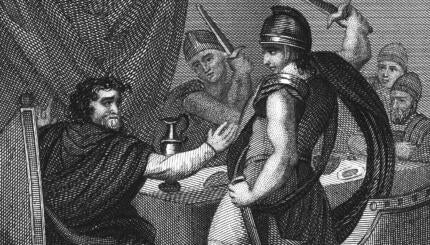Commentary on Parashat Devarim, Deuteronomy 1:1-3:22
The legal scholar Robert Cover famously wrote: “For every constitution there is an epic, for each decalogue a scripture.” What he meant is that central legal texts like the American Constitution or the Ten Commandments never stand alone as authoritative collections of law. The stories we tell about them — how they came to be and why they are authoritative — are an essential part of accepting, interpreting and living by them.
This week’s Torah portion begins the final book of the Torah, a series of parting speeches Moses makes to the Jewish people before they enter the land of Israel. With this speech, Moses provides a framing narrative to link the laws of the Torah with the story of the Jewish journey.
We might have expected a retelling of how Moses led the Jews out of slavery to become the nation who takes care of the stranger and needy, “for you were once a stranger in the land of Egypt.” Or perhaps for him to retell the story of the extraordinary encounter at Sinai where God’s Torah was revealed to the Jewish people. These will be retold later in the Book of Deuteronomy, but in this week’s portion Moses doesn’t focus on the miraculous moments wrought by God — but on the trajectory of the Israelites themselves after these foundational events. And it is not always flattering.
Moses begins his speech by reminding the people how hard it was for him to initially lead them because they were frequently rebellious against God and contentious with one another. In anguish, he recalls: “How can I bear unaided the trouble of you, and the burden, and the bickering!” (Deuteronomy 1:12) To solve the problem of the many disputes, Moses recalls, he appointed tribal leaders to handle the judicial needs of the growing nation. He taught them the ethics of maintaining a just court system and stayed on to advise and adjudicate only the most difficult cases.
With your help, My Jewish Learning can provide endless opportunities for learning, connection and discovery.
This delegation of power among the tribal leaders, Moses next recalls, did not solve the larger problems of national governance. Afraid of the task God has set them to conquer the promised land, the people demanded that Moses send spies to preview the land. And these spies, in turn, exaggerated the danger, spreading fear among the people. In anger, God stipulated the Jews to wander in the desert until that generation died out. In response, some defied God and recklessly entered the land prematurely, where they met a quick death.
Both the people and Moses, as their leader, are experiencing growing pains. There is no triumphant moment here. The organizing principle seems to be Moses’ eagerness to pass the blame: “Because of you God was incensed with me too, saying: You shall not enter the land either.” (Deuteronomy 1:37)
But as the Torah portion continues, the story changes. As time passes, the system works better: God instructs Moses, Moses instructs the people and the people obey. God tells them which nations to leave in peace and which to do battle with. They comply and are successful in their campaigns.
Moses’ retelling of the Israelites’ recent history leaves out many details from the Book of Numbers, including constantly renewed complaints about food, transgressions of the young nation and lost battles, all in the service of describing a neat trajectory from quarrelsome rebelliousness to mature submission. As a coming-of-age story, the mistakes lend color to the past. Moses might have attempted to hand over leadership to the tribal leaders prematurely, but the nation has now matured into a more responsible follower of God.
It’s remarkable that Deuteronomy doesn’t just provide us a framing story for the Jewish constitution; it shows us how it was built and the troubles along the way. Moses’ retelling creates a case for submission to God and God’s appointed leader as a path to peace and prosperity. It is a message the Israelites will need because Moses himself will soon depart — his time with them has run out. This framing narrative must be their map for a successful future.
Moses’ opening speech in Deuteronomy does more than recount history — it reframes the past as preparation for the future. His narrative does not idealize the people or his own leadership. Instead, it portrays a nation that stumbled, grew and is now poised to take responsibility. By placing this coming-of-age story at the gateway to the land, Moses models what Robert Cover explained: that law alone is never enough. The Torah’s authority emerges not just from its commandments, but from the story it tells about the people’s capacity to make mistakes and grow from them, with the Torah as a guide.



